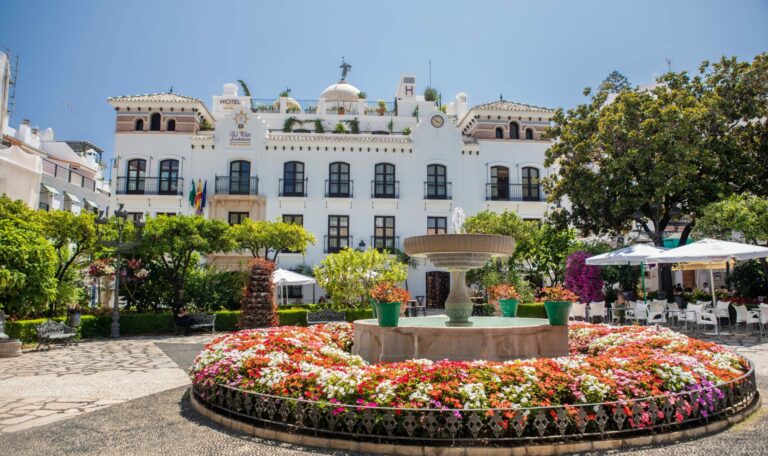Have you ever dreamed about whiling away your days on a Spanish beach, toes in the sand, glass of sangría in hand? It turns out your dream might be a lot closer than you think, thanks to the Spanish “Golden Visa” program. The scheme offers residency to anyone who purchases real estate worth at least €500,000 (around $600,000). Down the line, you could even qualify for a Spanish passport.
Your dream might be closer than you think
So what can €500,000 buy? According to Luis Rodriguez, Co-Managing Director of SBE, a luxury development company based in Marbella in the south of Spain, the answer is quite a lot.
“From a cost perspective, the south of Spain is considerably more accessible than prime locations in Madrid and Barcelona. This has led us to see a sharp increase in demand away from heavily congested major cities, towards the south, as buyers search for more attractive purchase options, as well as improved quality of life and natural surroundings,” says Rodriguez.

“In the Spanish Costa del Sol, €500,000 can buy you a wide range of properties, from a three-bedroom apartment, to a townhouse or, in some cases, even a fully detached villa with private garden. However, these properties are likely to be located in secondary locations or be in need of renovation,” he says, adding that potential buyers willing to raise their budgets to €1 million or more would be able to purchase a property in a more prime location at the higher end of the market.
Jason Callow Homes’ luxury real estate projects offer resort-style living with refined world-class amenities, such as high-end dining options, concierge services, residents-only social clubs, and elite fitness facilities. Current projects include EPIC Marbella, a development located on Marbella’s exclusive Golden Mile and designed in cooperation with FENDI CASA, which promises to set a new standard for luxury real estate on the Costa del Sol, and Sierra Blanca Tower that delivers upscale accommodations and jaw-dropping views, set right on the waterfront in Málaga.
Properties in EPIC Marbella start from €1.5 million for a four-bedroom duplex apartment, with a 1,000 square-foot covered and open terrace, while the Sierra Blanca Tower project offers one-bedroom apartments at an entry level price of €400,000.
How does the Golden Visa work?
Antoni Murt Prats is a partner at multinational law firm EY’s Private Client Services department in Barcelona. He explains that the Spanish Golden Visa program has become popular due to the many benefits it offers.
“Once you have your Golden Visa, you and your family members will enjoy the right to live in Spain, as well as freedom of movement within the European Union’s Schengen area, for a maximum period of three months per half-year,” says Murt, adding that another major advantage of the Spanish Golden Visa is that it comes with no time-in-country minimum requirement.
There are five types of investment through which to qualify for a Spanish Golden Visa. The applicant can choose to purchase any one of the following:
· €2 million in Spanish Public Debt
· €1 million in shares or participations of companies with real activity in Spain
· €1 million in a bank deposit
· €1 million investment funds established in Spain
· €500,000 in real estate
Once obtained, the Golden Visa has a one-year maximum duration. Investors wishing to remain in Spain for longer must apply for a residence permit, which is valid for two years and may be renewed for successive periods of five years. In the long term, holders may apply for a Spanish passport, providing they can demonstrate ten years of continuous residence (except citizens from Latin America, the Philippines or Equatorial Guinea, who can apply for Spanish citizenship after only two years of residence). As members of the European Union, Spanish citizens are entitled to live and work anywhere in the European Union.
“Although the Golden Visa is often the best way to obtain residency in Spain, the authorities can be quite strict about granting it,” admits Murt.
International law firms like EY are experienced in assisting non-EU clients who wish to invest in Spain and apply for work and residence permits. Tax is often a key concern, as anyone who spends more than 183 days a year in the country is considered a Spanish tax resident.
“As a tax resident, you are required to pay tax in Spain—including wealth tax and resident income tax,” explains Murt, adding that, in 2004, a new tax regime was introduced for overseas workers posted to the Spanish territory.
“Under specific conditions, the taxpayer may be entitled to pay tax at a fixed rate on income obtained in Spain,” Murt continues. “This is an important issue for a lawyer to study as part of the Golden Visa process, as it can have a huge impact on the taxation of income and wealth.”






